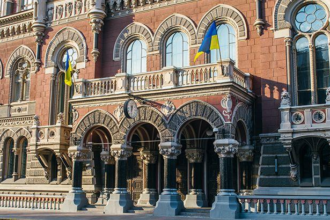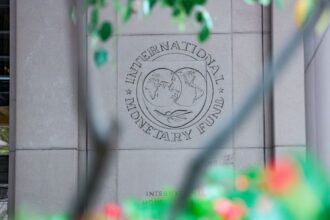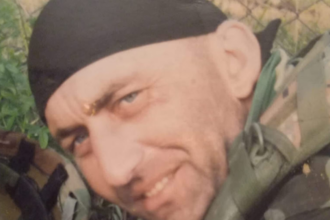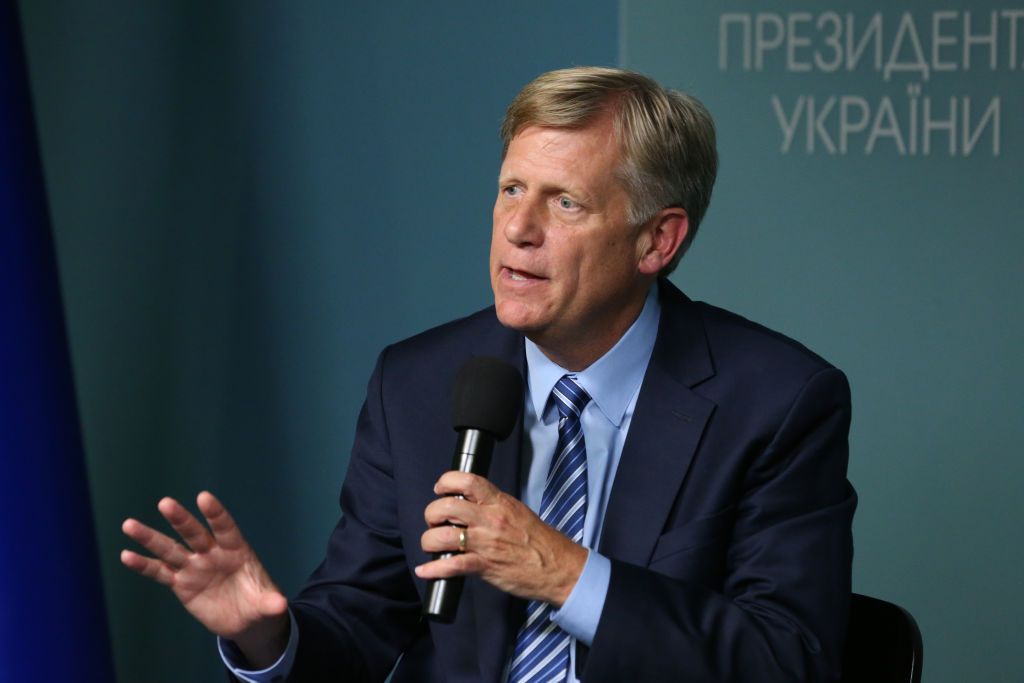Donald Trump, the Republican presidential nominee and former U.S. president, arrives at a rally in Salem Civic Center, Virginia, on Nov. 2, 2020. (Photo by Chip Somodevilla/Getty Images).
On November 5, U.S. citizens will vote in what could be one of the most important presidential elections in recent memory.
Former U.S. president and Republican candidate Donald Trump has a good chance of returning to the White House. He boasts about his good relationship with Russian leader Vladimir Putin and has criticized military aid and financial assistance to Kyiv. Many fear that he could try to dismantle NATO and American democracy.
Recent polls show Trump and Democratic candidate Kamala Harriman, who has pledged that she will continue to support Ukraine if elected are neck-and-neck as they enter the final stretch.
The Kyiv Independent interviewed Michael McFaul. He is a former U.S. The Kyiv Independent sat down with Michael McFaul, former U.S. Ambassador to Russia and professor of international studies at Stanford University. He also co-founded the Yermak McFaul Expert Group for Russian Sanctions.
The interview has been edited to lengthen and make it clearer.
The Kyiv independent: The U.S. presidential election is just a few short days away, and the polls are neck-and-neck. Russia is making progress in Ukraine, and now with North Korean troops. Democracies in Georgia and other countries are on their last legs. How grave is this moment?
Michael McFaul : At the end the Cold War you had one superpower. It was the U.S. There was a set of ideas to which almost everyone, both elites as well as populations, aspired. The three things were democracy, markets and a commitment towards what leaders at the time called a liberal international order. All three of these things have changed since then. One, the U.S. no longer holds the hegemonic position in the world. You’ve seen the rise of powerful countries like China and Russia.
Second, there is now an ideological divide, autocrats against democrats. The autocratic alliance includes China, Russia Iran, North Korea and some of their surrogates, such as Hamas and Hezbollah. The democratic world is made up of the U.S. and our NATO allies. It also includes our democratic allies from Asia and our partners like Ukraine.
Third, we have seen the collapse of this liberal international order. We do not have an agreement on what these rules are. In 2022, when they were most grotesquely broken in Ukraine, I would look back to 2014. The international system did not respond by saying, adhere to the rules. The majority of countries voted against it, but many remained on the sidelines. Countries like China were neutral. We saw the BRICS meeting in Kazan, where this group of countries met. To me, it was shocking to see that many democracies were present, and the head of the United Nations. This suggests to me that there is no longer a consensus on the international rules of play.
The Kyiv independent: If we look at the election, we can imagine America’s position in the world under a second Trump administration. Predictions range from someone who is a brutal isolationist, who says many things, but still throws their weight around the globe, to someone who is actively planning to abandon NATO, to side authoritarians and to open up the world to a free-for-all. How would you describe his rhetoric? Where do you think he falls on the spectrum?
Michael McFaul : I am deeply concerned about a second Trump administration, both for what he may want to do deliberately and what his signaling weakness might unintentionally provoke. I think that we should take him at his words when it comes to his rhetoric versus the reality. In his first term he relied heavily on traditional Republicans for his foreign policy team. People like (former Secretary) of State Mike) Pompeo (former) Secretary (James N.) Mattis (former) National Security Advisors) H.R. McMaster and John Bolton. McMaster and John Bolton were both establishment national security people. They stopped Trump from doing the most outrageous things he proposed, such as pulling out of NATO.
What will be different is that none of these people will be in the Trump Administration, as he has disparaged them all.
Second, Trump did not really understand how the government worked when he won in 2016 You know, his career was taking him in other directions. The government’s inertia on national security issues continued to be a problem, but in a positive way.
Trump has rarely spoken about his support for democracy, human rights, or freedom in other countries. He has always supported autocrats. He met with Putin and sent love notes to Kim Jong Un. I can’t recall a single time when he met opposition leaders in Iran, Belarus or China. Trump didn’t pay attention to the fact that budgets for promoting democracy actually increased during the Trump administration. Now that his team understands how it works, they will pay more attention and be in line with his goals.
Third, he’ll feel that he has an Electoral mandate to do these crazy things. If he wins, he will think that the American people will support him when it comes to NATO or our allies on the Asian continent. He would then tell Putin to do whatever he wants. I think that history shows us that when the United States of America is strong, when we demonstrate peace through strength, more peaceful outcomes are achieved. When we show weakness, when trying to appease dictators can lead to bad outcomes. First, I think it’s important to remember that neither the Soviet Union nor Russia has ever attacked a NATO member. There’s a group in the U.S. that believes NATO is a cause of conflict. It’s the exact opposite. NATO has stabilized and brought peace. I have no doubt that joining NATO will stabilize the region.
If we show that we are no longer committed to NATO in a credible way, we will then tempt Putin to test out our commitment. I don’t believe he will try to roll his tank into downtown Tallinn. I think he may test a certain operation in one or more Baltic states and then pull back to see what happens. This will cause a debate in NATO and be very destabilizing.
The Kyiv Independent : What do you think of Trump’s claim that he can bring the war to a quick end, if not within 24 hours, then very quickly by calling both sides to the table and forcing them there? What would a three-way game be like?
Michael McFaul says there’s good and bad news about this scenario. The good news is that, if Trump wins and makes that phone call, Putin, because of their ideological affinity, might be motivated to help Trump achieve this outcome if he believes, as Putin does, that a successful Donald Trump will serve the national interests of Russia in the long term. It’s possible that Putin has an incentive to make Trump look good, as it will help him achieve his other goals in the future. I am not optimistic about Putin’s willingness to do so for two very simple reasons. One, wars rarely end when the stronger side agrees to stop fighting because one side becomes weaker. Putin will be emboldened by Trump’s coming to power, and his signal that he is going to reduce or eliminate Ukraine’s assistance. He’ll think that my enemy is weaker now. This is the time to aim higher, not lower.
You can buy a map of Russia today and see that not only Crimea but also the four other (partially-occupied) regions in Ukraine are on the map. This is because Putin annexed these regions on paper. I don’t think he will give up those territories until he is stopped on the battlefield. Some Russians are crazy and say that we can have a peace agreement as long as Ukraine withdraws all of these territories (all of Donetsk, Luhansk, Kherson, and Zaporizhzhia Oblasts). It’s just a naive plan.
Would Trump change his mind if he was rejected? My Republican colleagues agree. I hope they’re right, but I’m afraid they’re not. I fear that Trump doesn’t really care about Ukraine. He doesn’t really care about the rules of international play or democracy. He doesn’t think annexing other countries is a good thing. He is still very concerned about his relationship with Putin. He has been consistent in his support of Putin and his admiration for Putin. This has never wavered.
The Kyiv Independent : It is good that you have brought up the issue of handing over more territory. Just to remind you, we are talking about the city Zaporizhzhia with 700,000 residents, and the city Kherson which was already occupied with another 300,000.
Michael McFaul (McFaul): You made a very good point, and I want to emphasize it, at least to people in the U.S. Americans, and Europeans – I don’t wish to mention all – almost reflexively say land for peace without ever thinking about what you said, which is that people for peace.
These are not uninhabited areas. We’re talking about the transfer of Ukrainians. We know how the Russians treat them. This is colonization. This is imperialism. As part of these swaps, we are talking about a genocide. It’s more than just land. These are Ukrainian citizens who are human beings.
The Kyiv independent: Many Ukrainians view a future Harris presidency simply as a continuation to the current existing policies: the policy where Ukraine is given enough support to stay alive, but not allowed to win. After two and a quarter years, the Ukrainian forces are overstretched. There is a severe manpower shortage that foreign aid cannot make up for. And Russia is advancing faster than at any time since early in 2022. Would President Harris, if elected, be willing change course and do something more brave?
Michael McFaul : I want to see the changes you describe. They’ve been too incremental in their assistance. They put too many restrictions. They have not enforced the sanctions regime in place which could reduce Putin’s supply of money and tech. On all fronts, there’s more to do. I hope that a few things will happen.
I hope that President Biden will make the right decision after the election to remove restrictions on the use long-range weapons. This will not cause World War III. This is Putin propaganda. We had a debate about Abrams tanks (air defense systems), Patriots and F-16. None of these weapon systems led to the use of nuclear weapons in Ukraine. I hope President Biden makes this decision, so that he does not hand it to President Harris. He should take it off the table and make it a fait accompli. That would be prudent.
Second, I hope that President Biden will signal America’s support of Ukraine’s NATO membership much more clearly. Maybe he should add some conditions: after the war and after hostilities are over. But I think that it should be automatic. When hostilities cease and wherever the border is — that’s up to President Zelensky, and the Ukrainian people. But wherever it is — that’s the day Ukraine should join NATO; that’s the day you ensure that there won’t be a third invasion in Ukraine.
About a President Harris : I know her friends, her national security adviser, Phil Gordon is a friend. He is well-versed in Europe. He is a European specialist and has taken a particular interest in Ukraine. On the campaign trail, Vice President Harris is always talking about her seven meetings she had with President Zelensky. Those are, I believe, good signs.
I think that the transition to a new Harris Administration will be similar to other transitions, where you get people with new ideas. I hope they will be people who understand the importance in defeating Putin’s Ukrainian army.
The Kyiv independent: What will it take for Putin, looking at the situation inside Russia today, to decide that he cannot continue this war? In Ukraine, many people are skeptical about the effectiveness of internal opposition against the regime.
Michael McFaul : Tragically, I can’t imagine a scenario in which the domestic politics of Russia will end the war. It’s a dictature. We have to admit – and this is a discussion I have with Russian leaders of the opposition all the time – that Putin’s not fighting alone this war. This is not Putin’s war. This is Russia’s War. This barbarism is supported by millions and millions and millions of Russians. They are the ones who commit the terrorist attacks and murders against Ukrainians. They are the ones who kidnap Ukrainian children. Tragically, more people now support the war than they did in 2022 at the start of the escalating invasion. The oligarchs will not get together and say, Hey, Vladimir, this is bad for us, too. They have their billions, because Putin gave them the permission to have them. We only have to help Ukrainian warriors defeat or stop the Russian invasion army. It’s that simple. There’s no need to go roundabout.
History does not repeat itself, but it can rhyme. There are many instances where defeating a war has led to political changes in a country, including Russia in 1917 and the war in Afghanistan. The Russian opposition has few effective ways to influence events in Russia. You would be best off if Putin lost this war. So I would encourage you speak out more about helping Ukrainians in the West and their supporters achieve this fact.
You can view the video version of this article on our YouTube channel.
Note from the Author:
Hello, this is Francis Farrell who spoke with Michael McFaul in this article. This is it. This is the moment which could make or break Ukraine’s struggle for independence, freedom, and existence. And it will be decided millions of miles away from Ukraine. The winter ahead will be dark and unpredictable, no matter what the outcome. But that doesn’t mean we’ll stop working. Please consider supporting our reporting.
Read More @ kyivindependent.com




